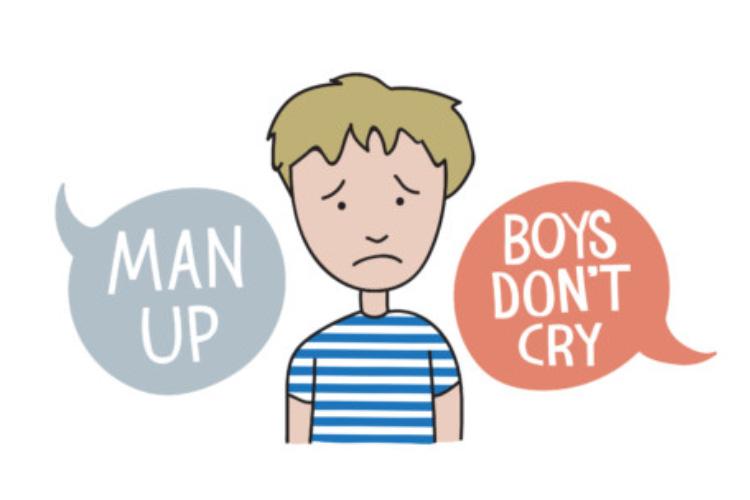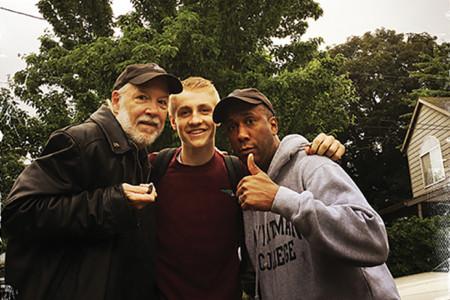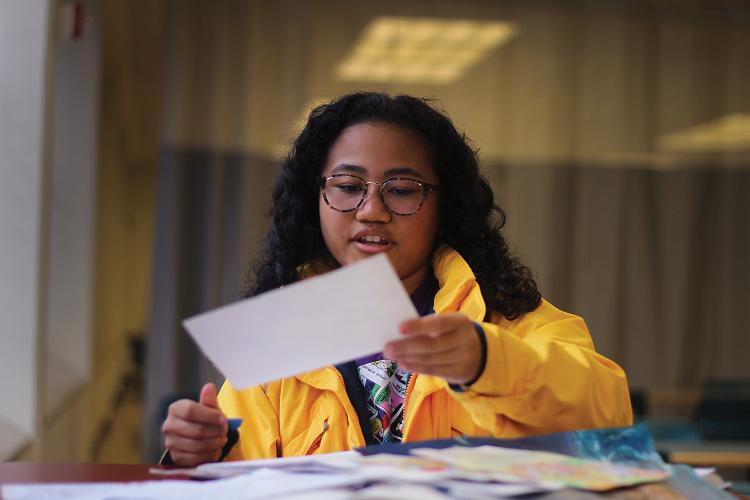
Chloe Artita-Guerrero steps onto the starting block at the Matt Dishman pool in Northeast Portland. She takes a deep breath and rolls her shoulders back before freezing. “Take your marks,” the starter says. And with those three words, an image of the Grant High School junior’s mother quickly comes into her mind.
The whistle blows and Artita-Guerrero, 17, dives in, vanishing underwater. Her thoughts of her mom linger as she propels through the water, legs kicking and arms straining with swift strokes.
She started swimming for Grant a year ago. In a way, it allows her to connect with her late mother who was an avid swimmer. “I think about her when I first jump in, and when I finish, how it would feel to have her see me finish,” she says. “If she was here, she would be the loudest one in the stands.”
Cynthia Artita died of liver cancer when Chloe was in seventh grade. Since then, Chloe has struggled to navigate adolescence without a mother.
At first, the young girl stayed with family members in her hometown of Mililani, Hawaii after her mother’s death. Her older sister at the time was a student at Oregon State University. She was left feeling alone and isolated. Her mom “was the only person I’ve ever had around constantly taking care of me,” Chloe Artita-Guerrero says now. “Because my mom wasn’t there, and my sister was up in Oregon, I felt like I had nobody.”
That kind of sentiment is common for people, especially teens, who have lost a parent. “They say … ‘I don’t want to be treated different, but no one understands what I’m going through,’” says Donna Schuurman, the senior director of advocacy and training at the Dougy Center for Grieving Children in Portland.
“I think that’s one of the biggest things I hear from teens, that sense of being alone, not being understood, feeling different, you know, and it becomes isolating.”
For students who have lost a parent, dealing with grief happens in a variety of ways. Some self-medicate to alleviate the pain. Others find themselves growing up faster and straying from the ways they were taught.
“Every individual is so unique. There’s no right or wrong way to (grieve),” says Kate Allen, a social worker in the Grant counseling office. “We see these five stages of grief or … people are kind of ready to move on or have a quick fix. But everyone is so unique in their journey.”
The overwhelming grief reaches all corners of a student’s life. Grades often slip, attendance at school gets spotty and social situations can be affected.
Talking about loss with peers and others is increasingly difficult as most people tend to avoid the topic of death entirely. But for Artita-Guerrero, discussing her loss is the best form of support, she says.
“I think people try to avoid talking about grief just because they don’t want to feel bad about it,” she says. “People should accept the fact that it happens and just talk about it when you need to.”
Chloe Artita-Guerrero was born Nov. 12, 1999, in Mililani, Hawaii. Her father struggled with alcoholism and wasn’t a part of his daughter’s life, so her mother raised her. Her sister, Briana, is nine years older and went off to college at Oregon State University when Artita-Guerrero was still young.
Chloe remembers how tight-knit she and her mother were early on. “She was full of life,” she recalls. “Most of the time when I think about her, she’s laughing.”
Together they made frequent visits to the local aquarium or the zoo. Her mother taught her how to swim when she was 5 on the beaches of Hawaii. As she grew older, her mom would take Mondays off from her job with the U.S. Postal Service so Chloe could miss school. They’d spend the day shopping and watching movies.
Most of her mother’s extended family lived in Hawaii as well, and they often spent weekends together. Sometimes, her mom would throw family parties at their house. “She’d just have this infectious laugh where as soon as she started laughing, everyone started laughing, and she always seemed to be the life of the party,” Briana recalls.
Things were going well for the family until the spring of 2012. Their mom slipped in the bathtub and broke both of her legs. But the X-ray also revealed something much more damaging. Doctors found that she had liver cancer and the disease had spread throughout her body.
Chloe was at the beach with friends when she found out her mom had gone to the hospital. When she arrived, her mom was heavily sedated. She remembers the moment the doctors told her about the cancer. “When you hear the term cancer, I mean, it breaks your heart really fast,” she says now.
Other Grant students say the news of a terminal illness sends shockwaves through families. Senior Sarah Barr was 6 when her mother was diagnosed with breast cancer. Barr says she was too young to understand what was happening.
A few years later, Barr learned more about the illness and was scared about what would happen to her mother. Doctors told the family the news wasn’t good. “There was a time limit,” Barr recalls. “So I never knew what was next.” In December 2013, Barr’s mother passed away.
Sophomore Tanis Nielsen lost her mom to cancer in 2014. Nielsen had been homeschooled by her mother, so they spent nearly every day together. She remembers her mother was diagnosed a year earlier. She didn’t know much beyond what family members told her. “It was like a holding pattern for that time,” she says. “I was just like filling time until something happened.”
When her mom passed away, Nielsen stopped feeling much of anything. She tried to be rational about it, but even knowing beforehand couldn’t prepare her. “I just continued on … I was just sort of numb,” she says.

For most teens, the death of a parent brings a halt to things immediately. The effects are wide-reaching, says Schuurman. One of the biggest issues Schuurman sees people go through while grieving is social isolation. “It becomes isolating … It’s too hard to be around people who don’t understand,” she says. “It can lead to depression, anxiety, hopelessness … It can be quite destructive.”
In the time before Artita-Guerrero’s mom died, she remembers being told by her mom that things would work out. Her “stupid hospital” stay would end soon, her mother told her. “She promised she was gonna come home,” Chloe remembers. “I trusted that that was what she was gonna do.”
Two days later, Artita-Guerrero had a conversation with her mother. She vividly remembers the last words she said to her mom: “I love you.” She still visited, but her mother, who always watched over her, was sedated and unable to speak. She died a few weeks later on March 14, 2012.
“I just started crying,” she recalls. “I wasn’t really thinking about anything but, ‘I hope they’re joking.’”
It took a week for her to come out of a state of shock. Time slowed to a crawl. “When you’re thinking about your parent passing away and that’s all you’re thinking about, time passes by really slow,” she says.
She spent that week with an aunt and was still unable to fathom what had happened. It felt like everything around her was collapsing.
Allen says students who have lost someone close to them are vulnerable. They have “a feeling of despair and feeling of really hitting rock bottom, that ‘this is the worst pain I can endure.’”
When Artita-Guerrero’s thoughts turned to the coming months, she was faced with the question of: Now what? “I wasn’t ready to deal with life without my mom,” she says.
As she moved around to stay with different family members, she sensed how difficult it was for many of them to have an orphaned child in their care. “I think it was because I remind my family members so much of my mom that they find it hard to look at me,” Artita-Guerrero says now.
She struggled with depression and felt a sense of guilt over her mother’s death. “I definitely felt like I could have done so much more for her,” she says, looking back. “And a lot of people told me it wasn’t my fault, but in my own way it was.”
Schuurman says a number of teens blame themselves. “It’s not unusual to feel guilt, to feel regret, to feel anger,” she says. “I think there are a lot of ‘if only’s.’ ‘If only I’d known, then I would have done something differently.’”
The after-effect made it nearly impossible for Artita-Guerrero to focus on other things. Her performance in school plummeted as she stopped doing most of her work. She also turned to drugs and alcohol to lessen the pain. “I don’t really know how it happened. It just sort of slowly evolved into a coping method,” she says. “It was more, ‘I wanna have fun, but I can’t have fun if I can’t forget,’ so I used that to have fun and forget.”
It’s easy for drugs or alcohol to become a crutch when feeling pain, Allen has noticed, because the result is so immediate. “Sometimes, those feelings or thoughts are so overwhelming for kids that they just need something to numb the pain that is so strong,” she says.
“I wasn’t ready to deal with life without my mom.” -Chloe Artita-Guerrero
Though some students find self-medication helps with grieving, others turn to different outlets. Nielsen wasn’t enrolled in school until the following year, so she started teaching herself math and literature from textbooks at home. She read from the vast collection of books in her house for hours every day.
She also found her view of the world – a lens of atheism and science – comforting. Believing that everything, including sadness, passes, and that there is no afterlife, helped her come to terms with her mother’s death. “She’s dead, and I’m sad about that, but there’s nothing I can do to change it,” she says. “I just remind myself of that.”
Like Nielsen, Artita-Guerrero had to come to terms with her mom’s death, something made easier by her move to Oregon. When Artita-Guerrero was 14, her sister suggested she move to Portland to live with her and her now-fiancé, Ian De Kalb.
When Ian’s parents, Cathy Woo-De Kalb and Mike De Kalb, heard Artita-Guerrero was planning to move, they suggested she live with them instead. They had already raised children and were committed to helping.
Moving to Portland was a fresh start for Artita-Guerrero. “Staying in Hawaii … with like all of the sad stuff that’s happened around me wasn’t good for me,” she says now.
The first few nights, Woo-De Kalb noticed that Artita-Guerrero was very quiet but never felt sad or scared living so far away from her home. “It just seemed like an easy fit, and it was. It seems like she’s always been here,” says Woo-De Kalb.
Just months after she got to Portland, Artita-Guerrero started calling De Kalb and Woo-De Kalb mom and dad. It gave her a sense of belonging.
She feels stable now but still thinks of her mom everyday. “I always think about her at some point in the day,” she says. “Sometimes it’s randomly in the middle of the day, and most of the time it’s at night because I have a picture of us hanging up on the wall.”

For Nielsen, thoughts of her mom come every day, also usually late at night. Sometimes certain things trigger a memory. Recently, she was at a Speech and Debate Club tournament and was reading a short story in prose about a woman whose parents had died. During the parents’ decline, they had started to refuse food. “ I just completely broke down crying because that was something that happened to me,” Nielsen recalls.
Schuurman says new stages in life bring up the feeling of a person not being there. “There are all these things in your life that that person won’t be there for – graduation, marriage … having children, you know, successes.”
Grief, she says, is “never over. It’s always there.”
Artita-Guerrero feels that way about her loss. When she steps out of the pool at each meet, she wishes her mom was there to see her. “She just pops into my head once they say ‘take your marks,’” says Artita-Guerrero. “I kind of just wish she was in the stands. I kind of like to think that she’s still watching.”
Grief is an ongoing process, and loss isn’t something students “move on” from. “I hear a lot of kids talk about, ‘There will always be a piece of my heart missing. It just won’t be there. And I can live with a piece of my heart missing, but it’s still missing,’” says Schuurman.
Artita-Guerrero still thinks the topic of death shouldn’t be as taboo as it is. Her friends were one of her best resources when she was struggling, but even then, she felt like no one knew how to react to her grief. “For people that couldn’t relate, it was kind of more hard for them to talk about it, and they didn’t really know how to give you advice,” she says.
Artita-Guerrero wants to be able to talk about death without people trying to change the subject or becoming awkward and hesitant about the conversation.
In the meantime, she plans to maintain her own traditions to keep her mother’s spirit alive. On her mother’s birthday each year, Artita-Guerrero writes her a letter. She goes outside, reads it to the night sky and then throws it away. To her, it’s like a catch-up phone call.
“Now that I’ve kinda lived my life without my mom for a while, I can look into the future and see it,” she says. “But I wish my mom was here to see it, too.” ◆







































